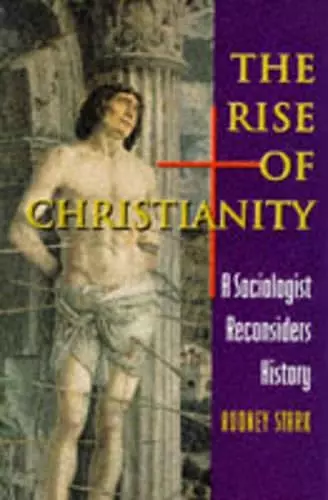The Rise of Christianity
A Sociologist Reconsiders History
Format:Hardback
Publisher:Princeton University Press
Published:17th Jun '96
Currently unavailable, and unfortunately no date known when it will be back
This hardback is available in another edition too:
- Paperback£16.99(9780691248042)

This brilliant and highly provocative book will revolutionize the way people think about both biblical studies and church history. -- Irving Hexham A provocative, insightful, challenging account... It is marvelous exercise in sociological imagination and a warning to those who like simple explanations. -- Andrew M. Greeley
The idea that Christianity started as a clandestine movement among the poor is a widely accepted notion. This book addresses beliefs and historical facts, and brings a sociologist's perspective to bear on the puzzle behind the success of early Christianity. It provides insights into why people convert and how new religious groups recruit members.The idea that Christianity started as a clandestine movement among the poor is a widely accepted notion. Yet it is one of many myths that must be discarded if we are to understand just how a tiny messianic movement on the edge of the Roman Empire became the dominant faith of Western civilization. In a fast-paced, highly readable book that addresses beliefs as well as historical facts, Rodney Stark brings a sociologist's perspective to bear on the puzzle behind the success of early Christianity. He comes equipped not only with the logic and methods of social science but also with insights gathered firsthand into why people convert and how new religious groups recruit members. He digs deep into the historical evidence on many issues--such as the social background of converts, the mission to the Jews, the status of women in the church, the role of martyrdom--to provide a vivid and unconventional account of early Christianity. The author plots the most plausible curve of Christian growth from the year 40 to 300. By the time of Constantine, Christianity had become a considerable force, with growth patterns very similar to those of modern-day successful religious movements. An unusual number of Christian converts, for example, came from the educated, cosmopolitan classes. Because it offered a new perspective on familiar concepts and was not linked to ethnicity, Christianity had a large following among persons seeking to assimilate into the dominant culture, mainly Hellenized Jews. The oversupply of women in Christian communities--due partly to the respect and protection they received--led to intermarriages with pagans, hence more conversions, and to a high fertility rate. Stark points out, too, the role played by selflessness and faith. Amidst the epidemics, fires, and other disasters that beleaguered Greco-Roman cities, Christian communities were a stronghold of mutual aid, which resulted in a survival rate far greater than that of the pagans. In the meantime, voluntary martyrdom, especially a generation after the death...
"This book is an exciting and important addition to the literature on early Christianity... It is a book of fascinating detail, yet its broad sociological assumptions will intrigue any person interested in church growth. It will challenge common theological assumptions. But, its creative and persuasive insights also will engage the thoughtful person. It is a very significant book."--Choice "Stark provides compelling reading, adding depth and coherence to the often nebulous hyperbole of historical hypotheses."--Library Journal "... likely to generate spirited argument."--Publishers Weekly
ISBN: 9780691027494
Dimensions: unknown
Weight: 510g
256 pages